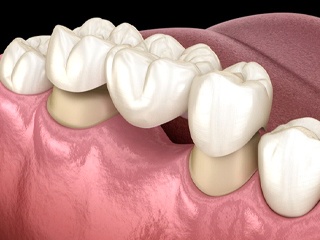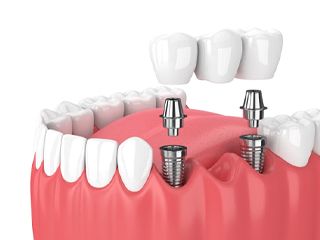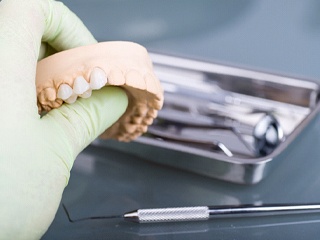Dental Bridges – Edison, NJ
Enjoy a Gap-Free Grin Again

An estimated 178 million people in the United States have lost at least one of their natural teeth. If you’re part of this statistic, know that you don’t have to live with an incomplete smile forever. By replacing these teeth with a dental bridge in Edison, NJ, you can enjoy a gap-free grin again. Here at Rosenfeld Dental Associates, Dr. David Rosenfeld provides bridges that are designed to resemble the pearly whites you used to have. Schedule your consultation today by giving our practice a call!
What Is a Dental Bridge?

A dental bridge is a personalized set of prosthetic teeth that is usually made from dental porcelain, which is known for its lifelike qualities. To place a bridge, each of the teeth on either side of the gap in your smile is fitted for a dental crown. In between these crowns are one or more replacement teeth, called pontics, that securely span the space where the missing tooth (or teeth) used to be. Once the bridge is placed, you’ll be able to speak, eat, and grin with the same ease you had with your natural pearly whites.
Types of Dental Bridges

To determine whether a bridge is the right tooth replacement for you, you’ll first need to attend a consultation with a dentist in Edison. During this appointment, Dr. Rosenfeld will explain the two types of dental bridges and help you decide which one would be best for your unique smile.
Traditional Dental Bridge
Traditionally, a dental bridge relies on two of your remaining teeth for support. Because these natural teeth need to have crowns placed over them, some of their enamel will need to be removed.
Implant Bridge
A bridge can be anchored to dental implants instead of your natural teeth. If several consecutive teeth are missing, then Dr. Rosenfeld can place one implant at either end of the gap. Once these artificial tooth roots have fused to your jawbone, we can secure your bridge onto them without altering any of your remaining teeth. Implant bridges are stabler than regular ones and can last for much longer.
The Benefits of Getting a Dental Bridge

When you replace your missing teeth with a dental bridge, you can look forward to some truly incredible benefits, including:
- Preventing the rest of your teeth from drifting out of alignment
- Enhanced ability to bite and chew
- Natural-looking, complete smile
- Long-lasting results (up to 15 years with a traditional bridge and 30+ with an implant bridge)
- Preservation of your jawbone (in the case of an implant bridge)
Dental Bridges FAQs

Tooth loss can affect more than just your appearance – it can impact your quality of life as well. Fortunately, you no longer have to live with gaps in your smile. At Rosenfeld Dental Associates, we offer dental bridges to replace your missing teeth. Even though they are a trusted tooth-replacement solution, it’s understandable to have some questions before committing. Below, we’ve answered some frequently asked questions from patients about dental bridges in Edison. If you don’t see your question, be sure to contact our team.
How Long Should a Dental Bridge Last?
Dental bridges typically last 5-15 years. The longevity of yours depends on a few factors like the materials used, the location of the dental bridge in your mouth, and how well you care for your smile. To elaborate, high-quality materials (we use porcelain) will naturally last longer than cheaper alternatives that are a short-term solution at best. The location matters as well since dental bridges toward the back of your mouth withstand a lot more pressure from chewing. And, of course, your oral hygiene routine will impact the condition of your teeth, gums, and dental bridge.
Is Getting a Dental Bridge Painful?
Before your procedure, we’ll numb your teeth with a topical anesthetic to ensure you’re completely comfortable. After your teeth are prepared to support a dental bridge, they may feel slightly sensitive for the next few days. The good news is you can easily manage your discomfort by taking over-the-counter pain medication as needed. If you’re receiving an implant bridge, you may experience mild soreness after your oral surgery. However, diligently following your aftercare instructions will help keep your pain to a minimum.
Can You Take a Dental Bridge Out?
No, since dental bridges are designed to stay in your mouth for years after they’ve been placed. You shouldn’t be able to take the restoration out by yourself – only Dr. Rosenfeld or another dental professional can do that. While you may have heard partial dentures referred to as “removable bridges,” that’s not accurate. One of the most notable differences between partials and bridges is that partials can be removed at any time.
How Many Teeth Can a Dental Bridge Replace?
Dental bridges can replace a single missing tooth or several in a row. As a result, they are ideal for patients who are missing 1-4 teeth. If you are unsure whether dental bridges are right for addressing your specific dental needs, then don’t hesitate to schedule a personal consultation with our dentist in Edison – he will help you decide.

